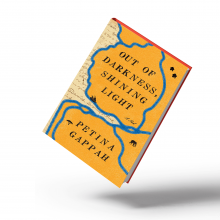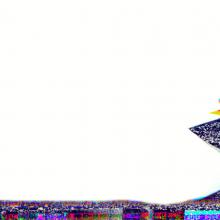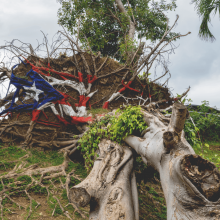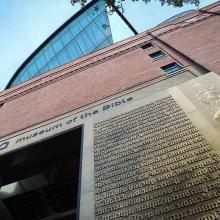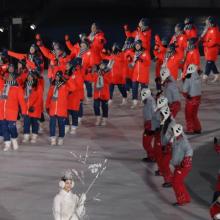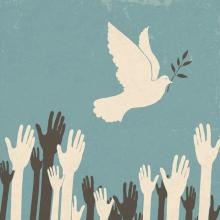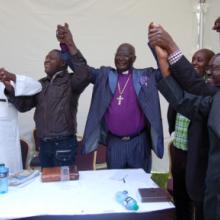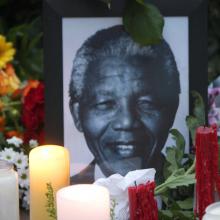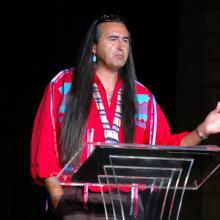colonialism
IN HER LATEST novel, Petina Gappah reimagines the death of Scottish missionary and doctor David Livingstone, focusing on his African servants, the names history forgot. They are Christians, Muslims, healers, porters, women, and children: a family of strangers who band together to carry Livingstone’s body, marching more than 1,500 miles in 285 days, so his remains may be claimed in Bagamoyo, Tanzania, and returned to England.
Every name on this trip holds stories that could occupy a novel of their own. To encompass them, Gappah employs two distinct narrators: Halima and Jacob Wainwright.
Halima, the doctor’s cook, is known for her sharp tongue, which ridicules the caprice of men and repeatedly tells of her youth as a sultan’s slave. In the early days of the journey with Livingstone’s body, Halima mourns the doctor, whom she calls “Bwana (Master) Daudi,” like a paternal figure. Though the men on the journey take credit, she is the one who proposes a way to preserve the doctor’s corpse for the long road ahead.
But Halima’s love for the bwana does not prevent her from noting his contradictions. She wonders why he would leave his family to search for the source of the Nile, argues with his colonial perception of a children’s game, and questions how a man who condemns the slave trade would have one of their company whipped.
As adults, if we get the chance to deconstruct our childhood faith, it can often be a traumatic process. Many of us share stories about working with a therapist to unpack trauma from the church, whether it is from the purity movement or the ongoing work of colonization. If you have spent much time on Twitter, you might find some of these conversations floating around, especially in ex-evangelical spaces. Many of us who grew up in the white evangelical church are asking questions about things like missions ideology, white supremacy in the church, toxic patriarchy and sexism, and violence against our LGBTQ friends.
Last week, the world was introduced to John Allen Chau, the U.S. American “adventurer” and missionary who was killed by an indigenous group on North Sentinel Island. According to a statement from missionary organization All Nations, Chau was a “seasoned traveler who was well-versed in cross-cultural issues” and had “previously taken part in missions projects in Iraq, Kurdistan and South Africa.” Now, Indian police have begun the dangerous mission of trying to recover the body even though a tribal rights group has urged officials to call off the search, claiming it puts them and the indigenous group in danger.
I'M TOO OLD, and so are my children, to set out cookies and milk for you. But I’m still hopeful enough to write you another letter.
Last year, with all the earnestness I could muster, I asked you for a white people intervention—many white progressive and evangelical Christians in the same room for a cleansing flood of white tears, some deep breathing and healing prayer, and time to plan to dismantle white supremacy from the inside.
But I have not received word that an intervention took place. I assume invitations to it went out or it got canceled, postponed, or taken over by the announcement of Supreme Court Justice Anthony Kennedy’s retirement. (Was that supposed to be a Christmas-in-summer gift?)
IT IS INTERESTING, yet not surprising, what the political status of Puerto Rico in the wake of Hurricane María reveals about colonialism, the coloniality of power and gender, emergency government response, and civilian resilience.
Hurricane María was the worst natural disaster Puerto Rico has ever faced and the 10th-most-intense Atlantic storm on record. But Puerto Rico has experienced more than 500 years of colonial activity between the Spanish and North American empires. In addition, because much of Puerto Rico’s religion came to the island through colonization and violence, many Puerto Ricans today still struggle to trust religion and may not see religious organizations as options for help in times of adversity.
My experience in post-María Puerto Rico has made me aware of the still-present legacy of the struggle against white supremacy, racism, heteronormativity, and sexism on the island. As an Afro-Puerto Rican feminist and Christian, I am aware of the ideological and religious struggles inherent in negotiating the nature of our citizenship with the oppressive political dynamics that are exacerbated by a massive natural disaster.
Hurricane María—and its sustained winds of 160 miles per hour—blew the neoliberal veil from the colonizers’ face. The limited response from the federal government in Washington, D.C., along with our unstructured colonial system, increased already-high poverty levels from 44 to 52 percent, according to the University of Puerto Rico, and swelled the numbers of people who left the island looking for better living conditions and a brighter future. After the hurricane, Puerto Rico’s status as an unincorporated U.S. territory blocked aid from several other countries, because the 1920 Jones Act only allows entrance to the island by U.S. ships.
Despite all this, the Puerto Rican people have demonstrated their resilience and capacity to overcome adversity. Citizen mutual aid, in partnership with nonprofit organizations and local churches, proved to be one of the most crucial and immediate forms of assistance after the hurricane.
In October, Shaaban Abdel-Gawad, the head of the Reparations Department, confirmed that the case was under investigation. Representatives for both the Museum of the Bible and the Green Collection say they have no knowledge of Egypt’s initiative. But if it proceeds, a second international scandal could rock their world. (Asked how many Egyptian objects are in the Green Collection, a Hobby Lobby representative emailed: “I’m sorry. That’s not information that I’m able to provide.”)
The colonial narrative that colonizers sometimes improve the lives of colonial subjects is false and is used as a propaganda tool by those who seek to justify continued invasion and colonization of the world through imperialism.
This is reminiscent of a time when European and American men went to Asia in the attempt to save Asian women from their own countries, or use Asian women for their pleasure, or — in many cases — both. In Pierre Loti’s 1983 novel, Madame Chrysanthéme, he writes a story of an affair between a French naval officer and a wife he’s taken in Japan. Loti describes the woman and her friends as docile, submissive, and overtly feminine, much like how Mantis is described by other characters in the movie, from Ego to the overtly masculine Drax.
When Pope Francis unexpectedly announced last month that he would canonize the Rev. Junipero Serra during his visit to the U.S. in September, he thrilled the many fans of the legendary 18th-century Spanish Franciscan who spread the Catholic faith across what is now California.
But the pontiff who has decried the “ideological colonization” of the developing world by the secular West is now facing criticism from those who say Serra — called “the Columbus of California” — abused Native Americans and pressured them to convert, aiding in the devastation of the indigenous culture on behalf of the Spanish crown.
“Serra was no saint to us,” Ron Andrade, executive director of the Los Angeles City/County Native American Indian Commission, told the Los Angeles Times.
Some of Serra’s sharpest critics say he was part of an imperial conquest that beat and enslaved Native Americans, raped their women, and destroyed their culture by forcing them to abandon their traditional language, diet, dress and other customs and rites.
Add in the diseases introduced by these Old World invaders, and the original indigenous population of perhaps 300,000 was decimated by as much as 90 percent.
“If (Serra) is elevated to sainthood,” Nicole Lim, the executive director of the California Indian Museum and Cultural Center in Santa Rosa, told The New York Times, “then (Serra) should be held responsible for the brutal and deadly treatment of native people.”
LIKE MUCH OF the world, I’ve been thinking quite a bit about ISIS over the past few months. I’ve been horrified by the accounts of the so-called Islamic State’s barbarism, and I lament their perversion of one of the world’s great religions.
Most of all, I’m outraged at their disregard for human life—at their wanton killing of Shia Muslims, Christians, Yazidis, and anyone else who doesn’t share their radical vision. Pope Francis has said that it’s legitimate to act to protect innocent lives in this case, and I don’t disagree with him.
Yet I believe that Jesus calls us to be peacemakers, which requires us to think beyond short-term military solutions and address the systemic issues that breed crises like this one. And I strongly believe that to have any moral authority in the current crisis, we must first confess the Western policies and attitudes that have contributed to where we find ourselves today—and then repent of those policies and attitudes.
The first thing we need to confess is a shallow and, at best, incomplete understanding of ISIS. Alireza Doostdar of the University of Chicago Divinity School wrote, “[We] seem to assume that ISIS ... has suddenly materialized out of the thin ether of an evil doctrine. But ISIS emerged from the fires of war, occupation, killing, torture, and disenfranchisement. It did not need to sell its doctrine to win recruits. It needed above all to prove itself effective against its foes.”
A call for greater acceptance of gays and lesbians has put African and Western churches on a collision course, as some African clerics liken mounting criticism from the U.S. and Europe to a new wave of colonization by the West.
“Homosexuality is equivalent to colonialism and slavery,” said one participant.
“We feel it’s like a weapon of mass destruction,” said another.
“It is not biblical and cannot bring blessing to Christians,” said a third.
Gitonga, a powerful East African Pentecostal church official, is among a group of Kenyan leaders who have launched “Zuia Sodom Kabisa,” Kiswahili for “Stop Sodom Completely.” The campaign seeks 1 million signatures to petition legislation to criminalize homosexual acts in Kenya.
These magazine articles and blog posts published by Sojourners through the years pay tribute to the great South African leader.
NELSON MANDELA was the most important political leader of the 20th century. While Roosevelt and Churchill helped protect the West and the world from Hitler’s Nazism, Mandela heroically exemplified the movement against the colonialism and racism that oppressed the global South, shown so dramatically in South Africa’s apartheid. And from a Christian point of view, he combined justice and reconciliation like no other political leader of his time, shaped by the spiritual formation of 27 years in prison.
Shortly after Mandela was released from prison, he came to New York to meet with a small group of Americans who had been involved in the anti-apartheid struggle, and I was blessed to join them. From the start, I felt in Mandela a moral authority I have never experienced with any political leader.
Attending Mandela’s inauguration in 1994 was a highlight of my life. We were picked up at the airport by friends, a couple who had both been in prison and tortured, but now she was about to become a member of the new South African parliament. We saw a group of the infamous South African security police. Having been interrogated by these thugs before, I immediately said, “Let’s get out of here!” To which they replied, “Don’t worry, Jim, they’re ours now.”
At the ceremony, joined by my South African friends, we watched Nelson Mandela announce his vision for a new rainbow nation. More than 100,000 people (and a billion or so more via TV) listened with tears in their eyes and great hope in their hearts.
THIS SHORT VOLUME by Jacqueline Battalora, a professor of criminal justice at St. Xavier University in Chicago, addresses a very important topic in American history and society: The legal, social, and political invention of the category of “white people” as a privileged group, which defines them as the normative Americans over against others, variously defined as “black,” “colored,” “Indians,” and “mulatto.”
When English settlers founded the New England colonies, they referred to themselves as British. As more people from other countries of Western Europe arrived in the area, they tended to group those they saw as similar to themselves as Christians, Germans, etc.—the term “white” was not used—over against “Negroes,” Indians, and rival colonizers such as the Spanish and French.
The term white was first used in colonial law after Bacon’s Rebellion in 1676, during which some African and European indentured servants formed an alliance. Virginia’s colonial leaders responded with a package of laws that created a racial caste of African-descended slaves, distinguished from European servants. These laws decreed that African slaves could not be freed and free Africans could not hold office, serve in the army, or hold European bond laborers. This group was thus disprivileged, in contrast with those of European descent who were defined as “white.”
ALL EYES WERE fixed on Richard Twiss, the Lakota/Sioux co-founder and president of Wiconi International, who stood center stage at the 2011 Christian Community Development Association conference.
Twiss pulled no punches as he told the truth about the church's role in colonization: The global genocide of indigenous peoples and the eradication of indigenous cultures by requiring people to cut their hair, leave their families, forsake their languages, and forswear their drums. Coaxed to convert or be damned, indigenous people exchanged their own culture for guitars and mission schools in order to be "Christian."
On Feb. 9, 2013, Richard Twiss passed to the other side of life. For many he was a key voice for indigenous people finding a way to reclaim their culture while keeping hold of Christ. While Twiss was a primary voice of the movement, he was also a member of a larger circle of indigenous leaders, each of whom has played his or her part to establish and spread the good news of cultural reconciliation after "500 years of bad haircuts," as Twiss liked to put it.
Twiss had enormous impact on the indigenous "contextual ministry" movement. "Contextualization means to present the good news of the shalom kingdom of Jesus Christ in a way that people can understand and relate to in their own cultural context," explained Randy Woodley (Keetoowah Cherokee), distinguished associate professor of faith and culture at George Fox Evangelical Seminary.
Among my must reads are the Sunday New York Times Book Review and other book reviews I come across in various media outlets. There are too many books being published that I would love to read, but just don’t have the time. So, I rely on reading book reviews as one way of keeping in touch with what’s being written.
Here are my picks in this week’s books of interest:
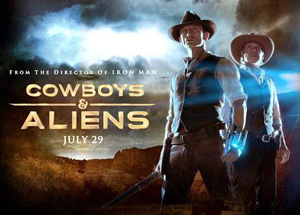 Americans have a hard time knowing how to respond to the sins of our colonial past. Except for a few extremists, most people know on a gut level that the extermination of the Native Americans was a bad thing. Not that most would ever verbalize it, or offer reparations, or ask for forgiveness, or admit to current neocolonial actions, or give up stereotyped assumptions -- they just know it was wrong and don't know how to respond. The Western American way doesn't allow the past to be mourned or apologies to be made. Instead we make alien invasion movies.
Americans have a hard time knowing how to respond to the sins of our colonial past. Except for a few extremists, most people know on a gut level that the extermination of the Native Americans was a bad thing. Not that most would ever verbalize it, or offer reparations, or ask for forgiveness, or admit to current neocolonial actions, or give up stereotyped assumptions -- they just know it was wrong and don't know how to respond. The Western American way doesn't allow the past to be mourned or apologies to be made. Instead we make alien invasion movies.
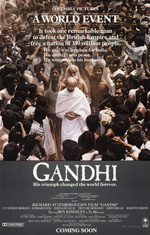 Ah the joy of watching movies in the summer! Of course, there are a number of summer blockbusters coming out that will woo crowds to the theaters, but with the sky-high prices of theater tickets these days, nobody will fault you for wanting to stay home and kick back with a rental. If you're looking for a film that will entertain and inspire you, consider adding some of these excellent films about social change to your online queue. If you have any other films to add to this list, please contribute your favorites in the comments section below. (To read more of my film reviews, check out my monthly column in Sojourners magazine.)
Ah the joy of watching movies in the summer! Of course, there are a number of summer blockbusters coming out that will woo crowds to the theaters, but with the sky-high prices of theater tickets these days, nobody will fault you for wanting to stay home and kick back with a rental. If you're looking for a film that will entertain and inspire you, consider adding some of these excellent films about social change to your online queue. If you have any other films to add to this list, please contribute your favorites in the comments section below. (To read more of my film reviews, check out my monthly column in Sojourners magazine.)
